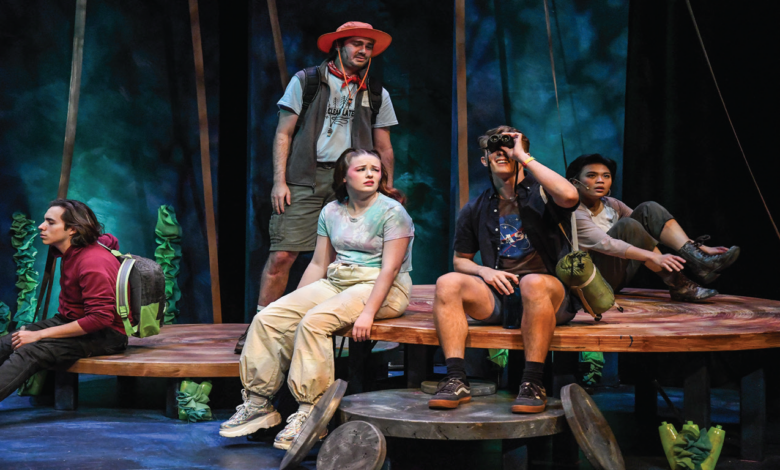
In ‘Clean Slate,’ everyone gets a second chance
By Zach Klein
Each year, thousands of new musicals are piloted at theaters around the world. Some move onto the next stage of development, while others fail and are never produced. One musical hoping to become a hit in the future began its journey Feb. 24 at Rider’s Yvonne Theater. “Clean Slate: A World Premiere Musical,” with music and lyrics by Kate Brennan and a book by David Lee White, is a co-production with the Passage Theater in Trenton, both assisting with the development process.
World premiere musicals are risky because there are so many things that could go wrong. Passage Theater artistic director C. Ryanne Domingues decided to take a risk and produce the show; however, after attending the first-ever performance of “Clean Slate,” I can report that the show is already far along in its formation. Its unique combination of teenage angst — think Tony winner “Dear Evan Hansen” — and spookiness — like TikTok sensation “Ride The Cyclone” — are a winning recipe in a competitive musical market.
The show centers around five campers at a wilderness rehabilitation center — protagonist Andi, played by junior musical theater major Ellie Pearlman; a fierce Leo, played by senior musical theater major Tiffany Beckford; a geeky Iggy, played by junior musical theater major Maclain Rhine; a wild Dion, played by junior musical theater major Nicole Duffy and a silent August, played by junior musical theater major Ricky Cardenas. Clean Slate, the camp where they have been sent for various legal offenses, is haunted by spirits of campers who came before them, including their counselor, Hercules, played by senior musical theater major Kaedon Knight.
At night, ghosts journey through the camp played by six echoes who come out from behind the set. One of these campers is Cassie, played by junior musical theater major Rylee Carpenter. The two have conversations each night until, (after many plot twists), it is realized that Cassie is a lost camper from a previous establishment and is actually the true mother of Andi, who has been in the foster care system since birth. After reconnection, Cassie is thrust into another life, but all ends well as the two get back together at the conclusion of the show.
Because this show is so new, it would benefit from a significant amount of polishing, fine-tuning and cutting. White’s book has a complete plot so there are portions of the show where 10 minutes have gone by without any music. In order to create a more balanced musical, portions of the book should be reworked so the same story can be presented with less detail. On the contrary, Brennan’s score has much potential to succeed as the show competes with other teen dramas. Pop-rock scores are all the rave right now, and Brennan succeeds at mixing an appropriate number of anthems, ballads and group numbers to balance the score.
From the act one group opener, “Slow Down,” to Cassie’s act two ballad “River Lethe,” this score has something for everyone who enjoys a good, modern musical. Rider musical theater students always produce top-notch performances, and this show was no exception. The chemistry between Carpenter and Pearlman, first as a friendship, then evolving to the discovery of a true mother-daughter relationship, was convincing even though the two actors are the same age. Pearlman played an Andi who desired any sort of human connection, and Carpenter, a Cassie who just wanted to be rescued after years on her own.
If this show continues beyond its initial stint, the pair should be considered as the Andi and Cassie to propel the show forward. Beckford, Cardenas, Duffy, Knight and Rhine also delivered performances that stayed true to the personalities each of these actors possess.
Part of making a character so authentic and believable is becoming them, and each of these actors did exactly that throughout the show, from Beckford’s bossy Leo to Rhine’s nerdy Iggy. Another element that made these characters so successful was that they were being played by actors not much older than the campers; therefore, they were not too far removed from age 17.
Perhaps the most impressive part of the show, however, was the scenic design, curated by senior theater design and technology major Bella Mazzoni. The set, made up of several hanging platforms that looked like tree stumps, stones and rocks, created an image of a remote, wooded environment. It was entirely designed by Rider students, which is impressive because of the intricate details of tree rings produced by the student painters. The set helped tell the story of the show and was used to its fullest potential throughout to help carry the message.
While “Clean Slate” still needs a bit of development to assist in the competitive musical market, I believe that with the right fine-tuning, it can become something with potential for regional theaters or licensing in the future. If you missed “Clean Slate” at Rider, you have a second chance to see it at Trenton’s Mill Hill Playhouse March 10-12. Hopefully, this is not the last we see of the relatable show.



